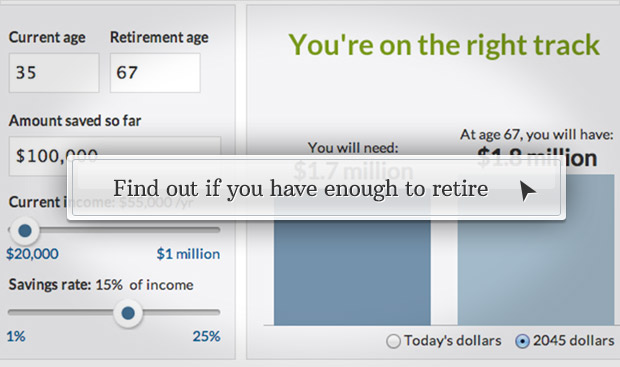Millennials may possibly not be ready to find the money for retirement necessities

Discover out if you will have ample to retire. Click on the graphic to use our retirement calculator.
While numerous Us citizens are falling brief on personal savings, millennials are most at threat of getting unable to afford essential retirement costs — this sort of as foods, shelter and health-related treatment, according to a Fidelity Investments survey released Wednesday.
Fidelity discovered that about fifty five% of men and women surveyed are at chance of being unable to go over these expenditures.
Supreme Guidebook to Retirement
- Getting started
- 401(k)s & business ideas
- Investing
- Annuities
- IRAs
- Self-work programs
- Pensions and benefit ideas
- Social Protection
- Insurance policies
- Estate preparing
- Residing in retirement
- Acquiring help
Normal little one boomers (born 1946 to 1964) are on observe to reach 81% of their retirement cash flow requirements, according to the survey. Generation X-ers (born 1965 to 1977) are anticipated to reach only seventy one%, and Technology Y or millennials (born 1978-1988) have the largest projected revenue hole at 62%.
The retirement provider asked more than two,000 Us citizens a variety of queries, from their health to retirement saving routines. It analyzed a range of aspects, such as existing income, financial savings charges, house fairness and projected Social Stability and pension positive aspects to forecast how much funds people will want in retirement and whether or not they are on keep track of to fulfill that aim.
Across generations, several folks basically aren’t conserving sufficient, Fidelity located, with 40% of those surveyed saving much less than six% of their salaries — far beneath the 10 to fifteen% suggested by fiscal planners. For millennials, that percentage jumps to fifty one%.
Also driving the disparity: Boomers are a lot more likely to have some kind of pension gain and strategy to operate lengthier, according to John Sweeney, Fidelity’s government vice president of retirement and investing methods.
Boomers had a median desired retirement age of 66, whereas millennials wished to retire two years previously than that. Yet present-day young people could dwell properly into their 90s and will have to wait until they are sixty seven in get to claim full Social Stability advantages.

Save a million ahead of you retire
“Some of the more mature people experienced a lot more sensible expectations,” he said.
Numerous youthful individuals are also playing it also protected with investments, he stated. Of millennials surveyed, fifty% explained they experienced significantly less than fifty percent of their investments in stocks. In distinction, frequent principles of thumb suggest that thirty-12 months-olds ought to have up to ninety% of their portfolio in stocks since they have decades of cost savings in advance of them.
It is not all undesirable information however. Sweeney mentioned that whilst they have the farthest to go, millennials also have the most time to capture up. Listed here are some important ways savers of all ages can improve their cost savings
Up your financial savings rate: For younger individuals especially, the most efficient transfer is to sock away more funds every single thirty day period, because money saved when young enjoys many years of compound returns.
Assessment your asset combine: Whilst you can not management the marketplaces, you can make positive your investment approach is age proper. Repairing a portfolio that is either too dangerous or way too conservative could substantially assist retirement readiness, Fidelity identified.
Retire afterwards: Doing work more time gives you much more time to conserve, boosts your Social Stability advantages and allows you use your retirement personal savings over a shorter time time period.
Far more than 2,two hundred households earning at minimum $ 20,000 annually took portion in the on the internet survey, which employed a nationally-consultant panel of respondents.
